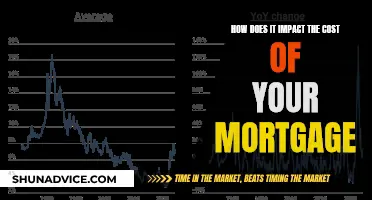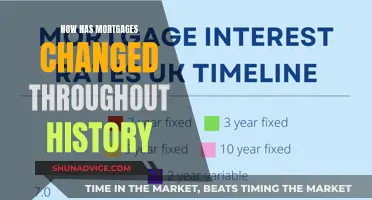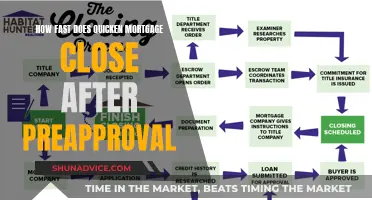
Researching mortgage property records can be a complex process, with varying levels of difficulty depending on location and specific property details. In the US, mortgage records are typically maintained by counties, and each state has unique recording statutes governing the process. These records are often accessible through county clerk or public records offices, either in person or via online search systems. While some information may be freely available, other details might require a fee for access or printing. The type of information that can be uncovered includes the borrower's name, property address, loan amount, property value, and more. These records can be invaluable for buyers looking to make informed decisions and strategic offers on properties.
| Characteristics | Values |
|---|---|
| Difficulty of research | It can be a time-consuming and arduous process, especially for commercial properties. |
| Record availability | Almost every recorded property will have a mortgage record on public file, but sales prices are not public record in every state. |
| Record location | Records are kept at the county level, but the specific office varies by state. They may be kept in the courthouse, clerk's office, or town office. |
| Online access | Some counties allow online access to records, but others require an in-person visit. |
| Record fees | While accessing records is typically free, some counties charge a fee for premium access or to print copies of documents. |
| Record contents | Records may include the property address, lender, mortgage amount, ownership transfers, and other information. |
What You'll Learn

Finding the right office
To find the right office to research mortgage property records, you need to know which county the property is in. This is because some counties keep mortgage records in the courthouse or clerk's office, while in other cases, the town itself handles the document.
The name of the office that keeps the records may differ depending on the state. In New York, for example, the Office of the City Register collects mortgage recording tax for properties in Manhattan, the Bronx, Brooklyn, and Queens, while for properties on Staten Island, the tax is collected in person by the Richmond County Clerk.
Once you have determined the county, you can then find out where that county keeps its records. Go to the website of whichever office maintains the records. On the website, there will be a form to fill out to access the records. Some websites will allow you to view the records online, while others may require that you physically go to the office. If you have to go to the office, someone there should be able to help you find the documents you need, and you should be able to view hard copies of the mortgage records. There may be a small fee to access the records.
Additionally, you can also access the clerk's official website and download the mortgage documents online. Enter the homeowner's information as required by the form, and pay any necessary fees. You can also find out how to conduct your search by calling the office in advance.
Switching Mortgages: Is It Easier Than You Think?
You may want to see also

Online vs in-person
When it comes to researching mortgage property records, you have the option of conducting your search online or in person. Both methods have their advantages and can provide valuable insights into property ownership, market trends, and more.
Online Research
Online platforms have made it convenient to access mortgage property records from the comfort of your home. Most counties maintain digital versions of their records, which can be easily accessed through the county's website or public records website. Some counties also provide access to scanned indexes, images, and maps related to real property. Online record databases usually require you to fill out a form with relevant information, such as the property address or owner's name, to initiate the search. This method offers the benefit of saving time and effort by eliminating the need to visit offices physically. Additionally, online records are often up-to-date, providing the latest information about a property's mortgage status.
In-Person Research
Conducting research in person involves visiting the relevant offices that maintain mortgage property records. This could include the county recorder's office, county clerk's office, courthouse, or local government office. The advantage of in-person research is that you can access more comprehensive information, including physical copies of records. Experienced staff members are available to guide and assist you in locating the specific mortgage records you require. In cases where online records are unavailable or incomplete, visiting these offices ensures you can obtain the necessary information. Additionally, in-person research may provide access to older records or historical data that has not been digitised yet.
Comparison
Both online and in-person research methods serve distinct purposes and have their advantages. Online research offers convenience and ease of access, making it ideal for quick searches and obtaining basic information. On the other hand, in-person research is more comprehensive, providing access to physical records and experienced staff assistance. It is particularly useful when you need detailed or historical information that may not be available online. Therefore, the choice between online and in-person research depends on your specific needs, the availability of online records, and the level of detail required for your research.
Mortgage Securitization: Benefits for Originators and the Market
You may want to see also

What information to expect
Public mortgage records can be a great source of information for prospective buyers, helping them make informed decisions and even giving them a competitive advantage during the bidding process. While the specific details available may vary depending on the location and the relevant laws, here is some information that you can typically expect to find in mortgage property records:
Property Description
The records will typically include a legal description of the property, such as its address, lot size, year built, and other relevant details.
Ownership Information
You can find out about the current owners or borrowers, including their names and motivation to sell the property. This information can be useful for potential buyers when deciding on their purchase strategy.
Mortgage Details
Mortgage records will show the lender's name and the amount borrowed or owed on the property. This information can help buyers determine how much to offer and give an idea of the seller's flexibility regarding the selling price.
Listing History
The documents will show how often the property has been listed, removed, and relisted for sale. This information can provide insights into potential issues with the property or the seller's motivation to sell.
Transfers and Assignments
Mortgage records will indicate if the mortgage has been transferred to another lending company or if there have been any assignments or endorsements on the loan. This includes information on whether the lender has sold the mortgage to another lender.
Property Value and Tax Information
Mortgage records can help in determining the current value of the property. Additionally, you may be able to access property tax records and information on past sales prices, depending on the location and availability of online records.
It is important to note that while much of this information is considered public record, the specific procedures and requirements for accessing these records may vary depending on the state and county where the property is located. Some counties provide online access to records, while others may require a physical visit to the county clerk's office or recorder's office. Small fees may also be associated with accessing certain records.
Zillow's Mortgage Estimate Secrets: What You Need to Know
You may want to see also

Using the information
Public mortgage records can be a great help when making an offer on a home. They can reveal important details about the properties you're interested in and help you make an informed decision. While sales prices are not public record in every state, there is still a lot of information you can obtain.
To access public mortgage records, you can either search online or go to the relevant office in person. If searching online, you can use a website like NETR Online, CourthouseDirect.com, or a real estate website such as Realtor.com, Zillow, or Trulia. If going in person, you'll need to find out which office holds the records for the relevant county. In some cases, the town itself handles the document. For example, in the US, records for Middlesex County, New Jersey, are held at the county clerk's office, while records for LA County, California, are held at the county recorder of deeds.
Once you know where to look, you'll need to gather some basic information about the property, such as the address or the owner's name. With this information, you can search for the property's mortgage records. Depending on the specific county, you may be able to access information such as the borrower's name, the property address, maps or surveys of the property, the square footage of any dwellings, and the property's assessed value. You may also be able to find out how much the owner borrowed on the home and how often the property has been listed for sale.
It's important to note that, while accessing public records is typically free, some offices may charge a fee for printing copies of the documents. Additionally, some offices offer premium access for a fee, which provides extra features such as checking the status of documents and printing without watermarks.
Mortgage Modifications: Understanding the Changes to Your Original Contract
You may want to see also

Fees and requirements
Georgia
In Georgia, the Department of Revenue provides links to each county's board of assessor's office, where mortgage records can be searched. The search can be conducted using the property address, property ID number, or owner's name. While accessing public records is typically free, some agencies, such as the Camden County Clerk's Office, offer both free basic access and premium access for a fee (e.g., $25 per month). Premium access includes additional features like checking for liens and printing documents without watermarks.
Hennepin County
Hennepin County offers property owners free electronic copies of their deed and certificate of title by emailing [email protected]. However, there is a fee per item for the subscription service. The county also provides a property information search tool to find tax, assessment, sales, and other relevant information. The research center has specific operating hours, and there may be requirements to view records in person.
Texas and New Mexico
In Texas and New Mexico, FileViewer provides access to scanned indexes and images of real property records, including mortgages. There are also email notification services available for recently filed documents related to oil and gas leases, mineral deeds, and more. In-depth research services are offered for ownership, minerals, liens, and easements, which may incur additional fees.
Colorado
The Colorado Division of Real Estate provides access to certain records through Open Record Requests. Requests must be submitted in writing to the Custodian of Records via email ([email protected]). The first hour of research and retrieval is free, but fees may apply for subsequent hours and for generating specific records. The Division will provide an estimate of the costs before proceeding with the request.
Online Sources
Some websites, such as CourthouseDirect.com, offer access to mortgage records from across the United States for a fee. These websites aim to provide fast and affordable access to courthouse documents and may offer online viewing or email delivery options.
It is important to note that requirements and fees may differ based on the specific county and state involved, and some locations may have unique processes or restrictions. Additionally, while many records are public, some may be exempt from disclosure, as outlined in specific statutes.
Completing Mortgage Satisfaction Forms: A Step-by-Step Guide
You may want to see also
Frequently asked questions
You can find mortgage property records by visiting the county clerk's office or public records office in person, or by checking the relevant website to see if a search can be conducted online. You will need to know the property address or the owner's name.
Mortgage records can provide important information about the property and its owner. This includes the property address, the amount owed, the property's assessed value, and how often the property has been listed for sale.
While it is typically free to access public records, some agencies require a fee to print copies of the documents. For example, the Camden County Clerk's Office offers basic access for free, but charges $25 a month for premium access.







